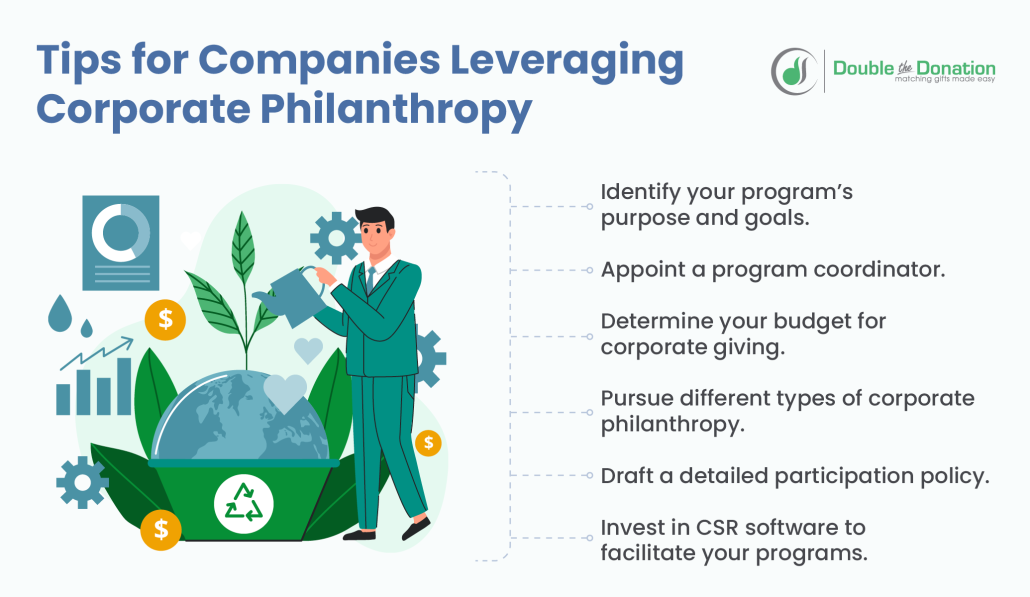The long-term impact of corporate philanthropy on environmental change
Discovering Just How Company Philanthropy Shapes Brand Name Online Reputation and Consumer Loyalty
Business philanthropy considerably influences brand credibility and customer loyalty. Companies that participate in genuine charitable initiatives commonly see a positive change in exactly how customers perceive them. This placement of worths promotes count on and psychological connections with audiences. The effectiveness of these kind initiatives can differ greatly. Comprehending what truly reverberates with consumers is important for brands looking for to enhance their social impact and market placement. What strategies will emerge as important for future success?
The Development of Company Philanthropy
As businesses significantly identify their duty in society, the advancement of company philanthropy has actually changed from simple charitable donations to a tactical part of brand name identity. Business involved in philanthropy primarily for tax obligation benefits or to improve their public image. With time, this technique changed as stakeholders-- consisting of capitalists, customers, and staff members-- required an extra authentic dedication to social responsibility.
Organizations started straightening their philanthropic initiatives with their core worths and business purposes, resulting in even more thoughtful and impactful payments. This modification has encouraged firms to buy sustainable methods and neighborhood development, promoting a feeling of objective that reverberates with consumers.
Moreover, technological innovations have actually assisted in openness and involvement, enabling organizations to display their kind initiatives better. As a result, business philanthropy has arised as an integral component of organization method, with organizations embracing the chance to positively influence society while boosting their general brand narrative.
The Influence of Philanthropy on Brand Assumption
While companies involve in philanthropic initiatives to advertise social excellent, these campaigns substantially shape brand name perception among consumers. Business philanthropy can improve a brand's image by connecting it with favorable social impact and community participation. Customers often perceive brand names that actively take part in charitable activities as even more trustworthy and liable. This perception can affect acquiring choices, as consumers might favor brand names that show a commitment to social issues.

Building Emotional Links With Giving
Company philanthropy acts as a powerful tool for enhancing brand name identity by connecting business worths with neighborhood requirements. Through critical providing, business can promote neighborhood involvement and develop shared worths that resonate with customers on a psychological degree. This method not only strengthens brand name online reputation yet also builds enduring connections in between companies and their stakeholders.
Enhancing Brand Identification
When business take part in kind initiatives, they not only add to societal great however additionally forge much deeper emotional links with their target markets. By aligning their brand name with charitable reasons, firms improve their identification and signal worths that reverberate with consumers. This placement creates a narrative that surpasses product or services, welcoming customers to participate in a common goal. As customers increasingly prioritize purpose-driven brands, business that actively take part in providing can separate themselves in a congested market. Such campaigns cultivate a sense of loyalty amongst clients that feel directly attached to the brand name's worths. Eventually, company philanthropy becomes a vital tool for enhancing brand identity, cultivating lasting relationships based on common ideas and psychological involvement.
Fostering Neighborhood Engagement
Countless studies suggest that companies taking part in community-focused kind initiatives can considerably reinforce emotional connections with their stakeholders. By buying local projects and sustaining social reasons, companies grow a feeling of belonging and depend on within the area. This engagement promotes a positive brand image, as clients appreciate companies that show real problem for social concerns. Additionally, employees often really feel extra happy and inspired to be related to an organization that focuses on area welfare. Therefore, consumers are most likely to develop commitment in the direction of brands that proactively add to significant reasons. Ultimately, promoting area involvement through philanthropy not only improves brand name reputation but also develops enduring emotional ties that profit both the neighborhood and the business it offers.
Developing Shared Values
Exactly how can businesses properly develop shared worths that resonate with their stakeholders? Firms can accomplish this by straightening their kind initiatives with their core goal and the passions of their communities. By taking part in campaigns that address local demands, companies promote psychological connections with consumers, improving brand commitment. Partnering with non-profits that mirror shared values reinforces the brand name's picture and demonstrates dedication to social responsibility. Furthermore, clear communication concerning these initiatives allows stakeholders to see the concrete effect of their payments. Inevitably, by integrating common worths into their company philanthropy, companies not just enhance their reputations but likewise cultivate long lasting connections with consumers, causing raised commitment and count on. This positioning is crucial in modern consumer decision-making.
Instance Studies: Successful Philanthropic Campaigns
Taking a look at successful philanthropic campaigns reveals various methods that improve brand credibility. Impactful neighborhood initiatives, innovative partnership versions, and lasting engagement strategies have actually shown efficient in fostering positive connections with customers. These case research studies highlight the relevance of thoughtful business giving in attaining both social and company goals.
Impactful Community Initiatives
Many firms have effectively leveraged kind projects to improve their brand credibility while making a meaningful influence in their neighborhoods. An innovation company launched a digital literacy program in underserved neighborhoods, supplying training and resources that encouraged local homeowners. This initiative not just added to neighborhood development but likewise positioned the business as a socially responsible leader. Likewise, a major food business executed an appetite relief project, partnering with local nonprofits to disperse meals to families in demand. This initiative strengthened area ties and cultivated customer commitment. Through these impactful efforts, business have demonstrated their commitment to social responsibility, efficiently aligning their brand worths with the demands of the areas they serve, eventually enhancing their general credibility.
Innovative Partnership Models
The success of impactful area campaigns this link typically rests on ingenious partnership versions that bring with each other diverse stakeholders to resolve complicated social challenges. Study highlight exactly how corporations, non-profits, and federal government entities can team up efficiently. For instance, a multinational company partnered with a local non-profit to release an education program, merging resources and expertise to improve area proficiency prices. An additional example included a technology business and a healthcare organization joining forces to create a telemedicine service for underserved populaces. These partnerships not just intensified the reach of humanitarian initiatives however additionally strengthened the brands' credibilities by straightening their goals with neighborhood needs. Inevitably, innovative partnership versions work as a driver for purposeful adjustment and foster stronger connections between brands and their consumers.
Long-term Interaction Techniques

Measuring the ROI of Business Social Duty
As companies increasingly purchase corporate social duty (CSR) initiatives, understanding the return on financial investment (ROI) connected with these initiatives comes to be essential. Measuring ROI in CSR is multifaceted, frequently including both qualitative and quantitative metrics. Financial returns can be examined through raised sales, boosted brand loyalty, and enhanced staff member morale, which can lead to higher productivity. In addition, firms may evaluate cost savings connected to sustainable methods, such as minimized waste or power usage.
Qualitatively, the influence of CSR on brand reputation can be examined with customer assumption researches and social media sites view analysis. Studies can offer understandings into exactly how CSR tasks affect client loyalty and depend on. Additionally, benchmarking versus industry requirements can assist companies evaluate their CSR effectiveness. Inevitably, an extensive strategy to determining ROI enables business to make informed decisions about future CSR financial investments, aligning strategies with both financial efficiency and social effect
Consumer Expectations and Company Duty
Increasingly, customers anticipate companies to operate with a strong sense of company obligation, checking out moral methods as a requirement for brand name commitment. This change in expectation mirrors a growing understanding of social and environmental concerns, leading clients to favor brands that align with their worths. Consumers are more inclined to support companies that participate in clear methods, show sustainability, and contribute favorably to their neighborhoods.
Social media amplifies these assumptions, enabling consumers to share their experiences and opinions rapidly. Brands that stop working to satisfy these honest criteria run the risk of backlash, while those that welcome corporate responsibility often delight in superior reputation and client commitment. As customers demand responsibility, firms need to integrate corporate social obligation right into their core techniques, focusing on honest behavior not equally as an advertising and marketing technique, yet as a basic element of their operations. This alignment can inevitably bring about more powerful brand fondness and continual success in open markets.
Future Fads in Corporate Philanthropy and Brand Loyalty
The landscape of business philanthropy is developing, influenced by the increased customer assumptions bordering corporate obligation. Companies are progressively incorporating social influence into their core organization approaches, not merely as a secondary activity. Future patterns indicate a shift towards transparency, with brands sharing in-depth details look at here about their humanitarian campaigns and their straight effects on areas.
Modern technology is playing a critical duty, allowing real-time interaction between brands and customers. Social media site platforms facilitate direct communication, allowing customers to articulate their assumptions and hold brand names answerable. Furthermore, younger generations, specifically Millennials and Gen Z, prioritize sustainability and moral techniques, driving services to take on more diligent strategies.
As business philanthropy ends up being synonymous with brand identification, companies that authentically align their goals with social needs are likely to cultivate stronger customer loyalty. This merging of worths will eventually shape the future of business credibility and customer connections in a progressively conscientious market.
Regularly Asked Questions
Exactly How Do Customers Learn about a Company's Philanthropic Initiatives?
Customers find a company's philanthropic initiatives with different networks, consisting of social media, news release, area occasions, and word-of-mouth. These opportunities promote understanding, enabling individuals to engage with brand names that line up with their passions and values.
What Role Does Worker Participation Play in Business Philanthropy?
Worker involvement in business philanthropy boosts engagement, fosters a sense of ownership, and enhances team communication - corporate philanthropy. This participation usually magnifies the effect of philanthropic efforts, bring about higher awareness and assistance for the company's kind initiatives
Can Corporate Philanthropy Backfire on a Brand's Online reputation?
If perceived as insincere or opportunistic, corporate philanthropy can without a doubt backfire on a brand name's online reputation. Negative public perception may emerge, leading to diminished count on and commitment among consumers who focus on credibility in company activities.
Are Smaller Sized Companies as Reliable in Philanthropy as Larger Firms?
Smaller sized firms can be equally effective in philanthropy as larger companies, commonly showing agility and authenticity. Their local initiatives may reverberate a lot more deeply with communities, fostering real links regardless of limited sources compared to their bigger equivalents.
Exactly How Can Business Select the Right Creates to Support?
Business can pick the ideal causes by aligning their values with area needs, analyzing stakeholder passions, and examining prospective influence. This tactical technique promotes credibility, improves engagement, and look at this website enhances connections with consumers and the wider community.
While companies involve in humanitarian efforts to advertise social good, these initiatives considerably shape brand name assumption amongst customers. As customers significantly focus on purpose-driven brands, firms that proactively involve in offering can separate themselves in a crowded market. Several business have efficiently leveraged kind projects to improve their brand name online reputation while making a purposeful impact in their areas. Progressively, customers expect companies to run with a solid sense of company obligation, seeing honest techniques as a prerequisite for brand name loyalty. As corporate philanthropy becomes synonymous with brand name identity, business that authentically align their goals with social demands are likely to cultivate stronger consumer loyalty.